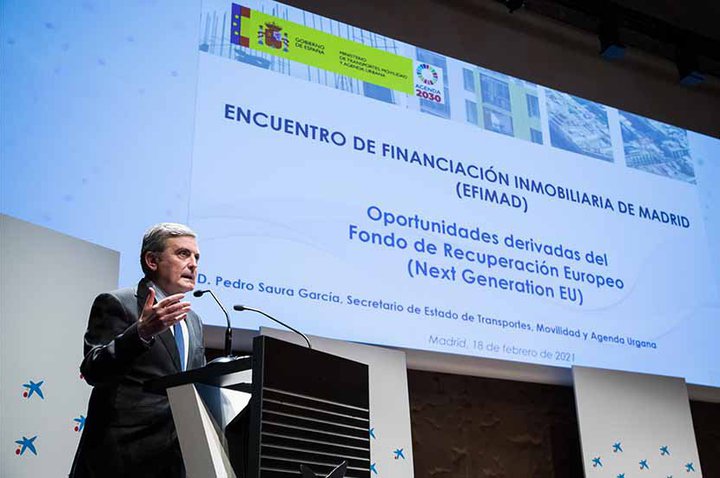Pedro Saura, Secretary of State for Transportation, Mobility and Urban Agenda
«The real estate sector is in a completely different situation in terms of its economic fundamentals when compared to the crisis of 2008. As such, we believe that it is one of the pillars of the Spanish economy towards its recovery». These were the words Juan Antonio Gómez-Pintado, president of ASPRIMA, shared with the participants at the VI Encuentro de Financiación Inmobiliaria de Madrid (Madrid Real Estate Financing Meeting) - EFIMAD. The event, organised by CaixaBank and ASPRIMA, also had an inaugural speech from Luis Cabanas, CaixaBank’s Banca de Empresas executive director.
Despite the confidence he showed in the sector, Gómez-Pintado added that «real estate and society in general will face a very challenging 2021».
The sixth edition was welcomed with particular attention after a difficult year marked by the effects of the coronavirus, where the real estate market showed its strength despite the situation and the uncertainties caused by the sanitary crisis.
Cabanas restated that «at CaixaBank we are happy with the sector’s behaviour in 2020, and I believed in its strength during these extraordinary times».
The meeting’s first presentation was by Judit Montoriol Garriga, economist at CaixaBank Research, who reviewed the big numbers which characterised the global recovery macroeconomic scenario, showing that the real estate market had a remarkable capacity for resilience in such a complex scenario as the current one, pointing out that «we are living a deadlock year and expect that 2022 will be the start of a new expansive cycle».
EFIMAD hosted two round tables. The first, «Real estate sector analysis. Present and Prospects» was moderated by Pedro Soria, chief commercial officer at Tinsa España. This round table featured Daniel Caballero, real estate business corporate director at CaixaBank; David Martínez, Aedas Home’s CEO; Victor Pérez, ASG Homes’ CEO; and Leticia Pérez, general manager at Dazia Capital and Darya Homes.
«2020 confirmed the resilience and strength of the real estate sector, its ability to react positively and quickly to the hardships. Data objectively shows that it should be one of the boosters to exit the crisis», stated Caballero.
In the second debate, «Commercial real estate analysis», experts performed a detailed analysis of the entire sector, detailing the causes for the current situation. Mikel Echavarren, managing director at Colliers International Spain, directed the meeting, in which also took part Adolfo Ramírez-Escudero, president of CBRE España; Fátima Sáez del Cano, executive director for Spain at the Grosvenor Group; Marta Cladera, general manager and in charge of the Iberian Division at Nuveen, and Javier Duro, commercial real estate director at CaixaBank. The latter was optimistic «because we are part of a sector with very solid fundamentals even if the current situation leads us to be prudent in terms of financing».
Between the two meetings, Pedro Saura, secretary of State for Transport, Mobility and Urban Agenda, presented an intervention called «Opportunities created by the European Recovery Fund». He commented that «the Government’s goal is double: to contribute for the recovery and to be transforming». He further stated that «the European funds will mark a milestone within the construction segment, with two great action axes: implementing an urban agenda and modernising public administrations».
Finally, Mar Santana, commercial director for companies within the Cental Territorial division of CaixaBank; and Mario Fernández Cortés, real estate business director in Madrid, concluded the interventions. Both highlighted the sector’s efforts to encourage gender diversity and for advancing in terms of sustainability and circular economy which are key for the future of society.




